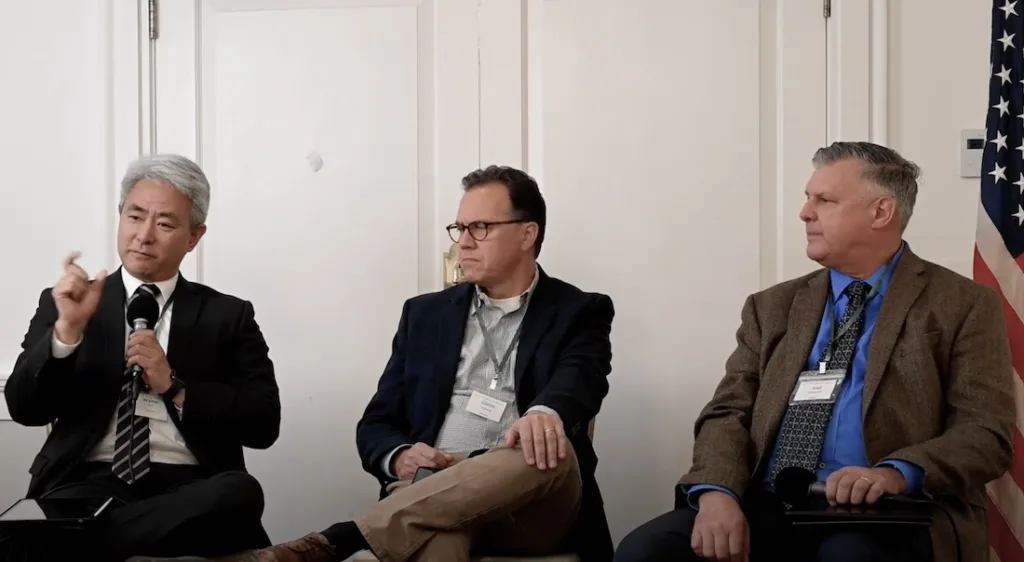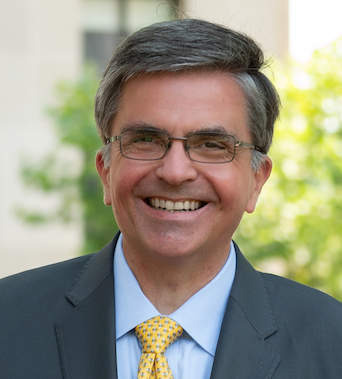The following morning panel discussion was held at IRD’s conference on the 75th anniversary of evangelical theologian Carl F.H. Henry’s book The Uneasy Conscience of Modern Fundamentalism on November 10, 2022 in Washington, D.C. featuring Walter Kim, Glenn Hoburg and Joel Woodruff. Special thanks to Josiah Hasbrouck for preparing the transcript.
LOCONTE: Let me briefly introduce this panel. Walter Kim is president of the National Association of Evangelicals. He regularly teaches in seminaries and discusses evangelical concerns with government officials. He has spent nearly three decades preaching, writing, and engaging in collaborative leadership. Let me underscore the word collaborative leadership to connect the Bible to the cultural and social issues of the day.
Glenn Hoburg serves as lead pastor of Grace Downtown Church, senior pastor of the Grace D.C. Network, a cross-cultural church network based in Washington, D.C. I know Glenn personally, and I can say this without qualification: He has been serving this city with integrity and with a deep heart of compassion for nearly 20 years. I am proud to call him friend.
Joel Woodruff is president of the C.S. Lewis Institute, which draws on the legacy of C.S. Lewis to develop whole-hearted disciples of Jesus Christ who will articulate, defend, share, and live their faith in personal and public life. I know many people in the DC area, Joel, who have benefited immensely from the ministry, so crack on with that. Take it away.
WALTER KIM: Thank you for the presentations this morning. It was informative, inspiring in many ways, very much at the heart of what the National Association for Evangelicals (NAE) does and stands for, whether it’s the Salvation Army, World Relief, World Vision, they’re all member organizations of the NAE and are actively engaged in this kind of public working out of the faith.
When I became president of the NAE in 2020, I was offered by my friends, simultaneously, congratulations and condolences. What a moment. I don’t come from an evangelical family. They have come to faith over the years. I am the son of a refugee: my father escaped communist China, literally crossing a river in a barrel to get to South Korea, where he met my mom. And together they founded faith-based organizations.
Long before I knew the word “evangelical,” long before my parents knew of the NAE, evangelicals were there in South Korea: distributing food and clothing, helping to rebuild the country. It was a Lutheran pastor who helped my parents immigrate to America. I was born in New York City. It was an Irish Catholic family in whose basement I lived and whose kids taught me how to ride a big wheel and get to the park.
It was a fundamentalist Baptist in high school who, after watching the movie Star Wars with me, shared the four spiritual laws with me in a parking lot. And I came to faith. My experience with people of faith, my family’s experience at many important junctures, was an expression of hospitality, the embrace of Jesus Christ. And becoming a Christian was something that reflected the invitation of God for Jesus Christ in the hands, arms, feet, and goodwill of people of faith, mostly evangelicals.
So, in that regard, I’m deeply indebted. But I certainly step into this space of leading the National Association of Evangelicals at a very difficult and contentious time. I want to raise a question, and, in many ways, Dr. Kidd, your presentation maps on to some of the comments that I’m going to make. What is evangelical engagement in the public sphere? You have to ask the question: which evangelicalism are you talking about? And in my own personal experience, I served as a pastor for many years at Park Street Church, downtown Boston, whose senior pastor, Harold Ockenga, was the founding president of the National Association of Evangelicals. This was the church that also gave rise to World Relief.
I’ve also served as a pastor, most recently in Charlottesville, Virginia, where I live. And I would say it is a tale of two evangelicalisms. Think about the history of Park Street Church. In the mid-1800s, William Lloyd Garrison gave his first abolitionist speech from the pulpit of Park Street Church. During that same exact time period, in Charlottesville, Va., Robert Dabney, a leading southern theologian, he made a robust defense at the Virginia Presbytery for the segregation of the church. Even after the Civil War, he was arguing that there was an insuperable difference between black and white people and that it would be inconceivable for a black man to ever teach a white man.
In the early 1900s, Park Street became the place where the first chapter of the NAACP was founded. Politically speaking, the NAACP has moved in various directions, but at that inception point it was profoundly rooted in Black Christian spirituality. Also in the early 1900s, in Charlottesville, the Robert E. Lee statue was constructed as an expression of white supremacy.
These two evangelicalisms were simultaneously unfolding. Harold Ockenga, who wrote the forward to The Uneasy Conscience of Modern Fundamentalism, preached a series of sermons in the 1950s called “The Church God Uses.” And in it, he talked about revival, a good evangelical theme. He said that if revival is ever to come to America—and we need it—we are going to have to deal with the sins of race, the sins of labor, the sins of war, and the sins of class. There were other streams of evangelicalism that privatized the faith and said it’s really about personal salvation. Revival will come with the accumulation of individuals coming to faith in Christ.
So you have to ask the question: What evangelicalism are you talking about? Evangelicalism has always been multifaceted. Now, having said that, there are certain impulses that are very much a part of evangelicalism with respect to its public engagement. And this will be maybe a seed-thought that we can generate further conversation.
The Bebbington Quadrilateral, as an explanation of what evangelical is, focuses on theological precepts. Evangelicals are highly focused on the Bible, on conversion to Christ’s atoning work at the cross, and on activism. We can all affirm that. Most evangelical churches, no matter what denomination, the 40 different denominations within the NEA, Presbyterian, Pentecostal Baptist Brethren, Mennonite, you name it, they’re all there. They’re going to be singing many of the same songs, preaching from the same Bible, giving the same kind of altar calls.
But there is the issue of our posture, of how do we engage with culture: What is the relationship between sacred and secular sources of knowledge? And how does the personal relate to the public? That has always been deeply contentious.
I think there are three ways that we can think about this issue of posture with respect to our public engagement, which bear upon the questions raised in The Uneasy Conscience. I would differentiate the difficulties that exist within evangelicalism in this way: Is our public engagement a matter of social application of the gospel, social implication of the gospel, or an actual social dimension of the gospel? And those three, while subtly different, are profoundly different in trajectory.
If it is a matter of the social application of the gospel, then of course, as evangelicals, out of gratitude for what God has done for us, we do unto others as an application of the Gospel. But it is not essential to the essence of the Gospel. You have evangelicals who respond out of gratitude toward God in volunteering at the soup kitchen, not because of a deep conviction of the nature of social change as a part of the Gospel, but as a reflection of their gratitude. I would say most evangelicals at least have that social application of the gospel out of gratitude.
But there’s something a little bit deeper, and I think Henry was trying to drive at that. It’s not nearly enough to say that there’s a social application to the gospel out of gratitude. There should be a social implication. In other words, there’s something inherent in the working out of the gospel itself that implies obedience, not just gratitude. It is discretionary in the ways you apply it, but it involves actual obedience. And I think this is what Harold Ockenga was getting at in his comment about revivalism, dealing with the sense of race, class, war, and labor, that there are social implications. And those social implications mean you need not only to have gratitude, but obedience, that there’s a gospel obedience incumbent upon evangelicals in the social outworking of faith.
I would wish to push even further and say that we really need to strongly consider that there’s not just a social application and a social implication, but also a social dimension to the gospel itself—that there is within it individual and institutional elements of following Jesus, that when the Gospel is proclaimed it has a fundamentally social dimension to its application.
It is not just about individuals coming to faith and societies and communities being transformed. You are baptized into a family, into a community in an extraordinary way that is not going to be known to us until the new heavens and the earth, even the powers and principalities, are brought into this work. The Letter of Ephesians talks about the proclamation of the Gospel, that even the mysteries of the powers and principalities are involved. I don’t know how. That isn’t a social dimension. That encompasses not just people, but the powers of heaven itself. That is extraordinary if it’s baked in.
That issue is profoundly weak in its development within evangelical theology, much less evangelical discipleship. We have tons of good work on what to do when a marriage falls apart. Evangelicals are great about that. Here are the ten books you can read. Here’s a seminar we’re about to put on. Here’s a ten-week class. Here’s a retreat you can go to and we’ll mentor you. We will connect you with an older couple who went through the same set of problems you are going through.
What about political polarization? Do we have a retreat for that? Do we have a ten-week course on that? Do we know how to mentor people in our political and public and social engagement of the gospel? If it is as essential a dimension of the gospel, then we need to do much better. And The Uneasy Conscience becomes, for us, a clarion challenge to build out a robust gospel: a robust understanding of the public dimension of faith as essential as the personal dimensions of faith are to the nature of the gospel.
GLENN HOBURG: I’m grateful for the opportunity to participate in this conference. And have learned much both from Henry’s work and my fellow participants.
Approaching twenty years of pastoring in Washington, DC there are two themes Henry raises which I find relevant in my ministry field.
The first concerns Henry’s call that the Church maintain its commitment to Word and Deed. These two pillars of Jesus’ ministry must remain if the Church is to be judged faithful. Christ never left the needy with the empty blessing (“Be warm and well fed”), nor was he silent regarding his Father’s will. In fact, Jesus’ deeds had the aim of pointing to his words. Similarly for the Christian, words without deeds are powerless, as deeds without words are meaningless.
For some years now, I’ve observed that today’s Christians (especially those in their 20-30’s) are more comfortable performing gospel-deeds than proclaiming gospel-words; more apt to serve their neighbor than urge them to ‘repent and believe’. They are not alone. The reasons for this are understandable. Weaned on the rule of tolerance and the law of personal happiness, as well as warned of the mortal sin of being “judgy,” speaking out about the gospel is socially risky, even deemed unloving.
In addition, many Christian young adults have had front row seats to the culture wars of their parent’s churches. Evangelistic witness wrongly gets equated with personal attack. Along with modeling winsome, humble sharing of faith, there must also be a recovery of the necessity of gospel-words. As Henry writes: “The ideal Hebrew or Christian society throbbed with challenge to the predominate culture of its generation, condemning with redemptive might the tolerated social evils, for the redemptive message was to light the world and salt the earth.” There is a “message” to redemption. As Christ’s witness we share the belief expressed by the great missionary and apostle Paul: “So faith comes from hearing, and hearing through the word of Christ”. (Romans 10.17)
The second issue where Henry displays almost prophetic insight concerns individualism. Of course, he couldn’t foresee contributing causes such as transience and cyber-isolation, but he did perceive the danger itself. I have seen this in multiple ways over many years. One pertains to the way Christians relate to their “place.” Individualism fosters the idea that one floats or glides over the place in which they live (and the people). That in turn produces a consumer-like attitude toward one’s place. For instance, many approach Washington, D.C. as a career launchpad, internship weigh station, or post-college playground. The people and neighborhoods are mere background scenery on the way to an all-important, world-changing job.
But is it possible to love our neighbor and ignore their place? When our neighbor shovels our front walk or helps beautify the park where our kids play, do we not feel loved? It’s impossible to love people in the abstract.
Instead of seeing our local church as a place-less, edification station for emotional and spiritual refueling, we must view it as the Presence of Christ in our place. Out of all faiths, the Christian faith is most place-centered. In the New Testament the Church is either qualified in one of two ways, “of Christ” or of a place, “to the churches in…” (Philippi, Galatia, Rome, etc.). In fact, the Place is so significant that God enters it, and his promise of redemption includes it. Individualism weakens the more we see Place as essential to our faith.
A second effect of individualism, and an issue Henry repeatedly names, relates to racial prejudice and injustice. Many sins can be seen to have caused slavery, Jim Crow, as well as modern-day prejudice; sins such as materialism, theft, power-lust, etc. But one often gone unnoticed is “corporate individualism.” In this case, it means seeing one’s racial group as separate and set apart from the rest of humanity, the singular or “blessed” image of God.
The legacy of this in the modern, white evangelical church can be seen in an it’s cultural inflexibility. Minority believers are welcome if they assimilate into the dominant culture and are satisfied with token leadership. Having first planted and pastored a 98% majority white church and now years later a growing cross-cultural church and network, I am continually made aware of hidden and unspoken commitments to mono-cultural ministry. No surprise, it is through our members-of-color by whom God mercifully brings this to light.
I can also look back and see corporate individualism in ministry training. For instance, my education in biblical ethnics focused upon concerns relevant to white evangelicals (i.e., divorce, abortion, homosexuality), yet omitted, or worse, looked with suspicion upon those outside of white culture, though repeatedly found in the Old Testament (i.e., the poor, stranger/alien, oppressed). However, when idolatrous individualism is relinquished, the concerns that touch my minority culture brother and sister become mine.
After all, we are “fellow citizens,” “one Body,” “the household of God,” and our grand telos is to be Christ’s Bride of every tribe, tongue, and nation. The image of God is not singular (one race or gender), but plural. Individualism results in a mutated expression of Christ’s church, whereas congregation’s submissive to the Spirit’s transformation find themselves radiating the beauty of our God in Christ.
JOEL WOODRUFF: Thanks, Joe and Mark and Walter and Glenn and all the speakers. It’s been a fascinating time to just think about some of these issues. I’ve been reflecting on the questions that were posed to us: what have evangelicals done well and where do we need improvement? My own experience, I feel blessed to have grown up in the evangelical world. My grandparents and my father went to Wheaton College, which was established as an abolitionist school, by the northern evangelicals who were fighting against slavery. The first class at Wheaton was integrated with black and white students. I also went to Wheaton.
I think Carl Henry influenced my father and probably my grandfather in many ways. It was the age when they were trying to push evangelicals to think about higher education. And my father won a scholarship to go study at the University of Edinburgh, got his Ph.D. there, and he started to pursue education through some of the highest centers of academic learning. His first job was at a small Christian college in Missouri, Missouri Valley College.
As I grew up in a in a during the 1960s and 70s, my father, we had Tom Skinner, a noted African American preacher, in our house. We had black students, white students, Asian students. I just assumed that was normal. My dad was known on campus, and well-loved, as a chaplain and professor of theology, and black students and white students would come to him. He led many to Christ. So, the whole idea of personal commitment to Christ was really important to my father as an evangelist.
But he also fought on his campus for civil rights and for social justice. Growing up in this small town in Missouri, I think I was maybe a little bit naïve, in that I thought this was just normal. I didn’t know evangelicals had quite this history with race.
My own experience of Wheaton was fabulous. The idea of the integration of faith and learning was really powerful for me. It gave me a global perspective of Christianity. There were kids from all over the world, and we had this picture of the gospel going out. And I spent time over in Europe with parish church ministries, tent-making groups, and then and then at the European Bible Institute, where they train Europeans to serve the kingdom. So, I think my evangelical experience has been very, very positive. Like many of you, I know many wonderful people in politics and business and government.
At the C.S. Lewis Institute we’re trying to be a servant ministry. The church comes alongside the church. Our founders, James Houston, who started Regent College in Vancouver, and Jim Haski, a golfer, had been talking to John Stott and others and realized there was a need to equip working professionals, highly competent, highly educated Christians. But they needed a way to really express their faith in a loving, gracious way in the secular world. And, so, I have been blessed to be part of this effort.
But I do know that there are a lot of issues out there in the evangelical world. C.S. Lewis brings insight into some of these questions in Christianity. He talks about the fact that there’s this maxim, that “some people are just too heavenly minded to be any earthly good.” But Lewis flips that and he says, actually, it’s the people who are most heavily minded who have done the most good, the most for human flourishing in the world today. Lewis said that if you aim for heaven you get Earth thrown in; and if you aim for earth, you get neither.
One of the dangers we have to face as evangelicals is that when we’re working in the business world or the political world or whatever it might be, our causes can get so important to us and the earthly changes we want to see happen—and we sometimes lose focus. We have to realize that our focus is meant to be heavenly minded. If we’re doing that, we’re going to be loving God and loving our neighbors as ourselves, and really benefiting the world.
But it’s easy to get caught up in the world’s way of doing things as we fight for good causes. I have been thinking about 1 Peter 3:15, where Peter says that we’re to live holy lives. And when we’re asked to give a reason for the hope that’s within us, he says we’re supposed to do that with sarcasm, rancor, anger, and vitriol. No, of course not. He says to do this with stillness and respect. If we as evangelicals can address the issues of our day with gentleness and respect, being thoughtful—we’re not always going to get a hearing and people may not always accept our world view—but if we can at least represent the character of Christ, I think there can be change. And I do believe that.
Talking last night, Jonathan mentioned the importance to the local church. I do think the answer is in the church. Our ministry, the C.S. Lewis Institute, is to come alongside the church to equip people to live out their Christian lives. The church is where the question of calling can be addressed. Earlier the question was raised about reaching people locally but also doing something at a national level. Well, it comes down to calling: God calls some people to address things at a national level and he calls some people to address things at a local level.
In the local church, if the church is healthy and really seeking to love God, to love their neighbor, integrating the gospel message—that’s where many good things happen. The church is doing amazing things in the United States and around the world.
If you’re a pastor, people will often ask you, how successful is your church? And often in the evangelical world today we define success by the ABCs of attendance, of how many people are coming, of how much cash you have on hand. If you have AB and C, you’re doing great. But we’ve forgotten the most important letter: D, which is for disciples. In the great commission, Jesus said we were to go into all the world to make disciples, baptizing them in the name of the Father, Son, the Holy Spirit. That’s supposed to happen in the local church.
But that last line we sometimes of wax over, which is to “teach them to obey everything I’ve commanded.” And it’s a lifelong journey. Discipleship is a lifelong journey. But true success is when we see mature disciples of Jesus Christ who know they’re calling, and they’re equipped. They know how to share the gospel with other people through word and deed.
There’s a danger today. The social justice movement is wonderful. It’s wonderful to see people freed from human trafficking. But we must combine word and deed and always be bold to proclaim the gospel. That is hard to do in society. But I know that God is at work and doing amazing things, and if we seek to do that, I do think there will be wonderful change.
I’d like to encourage you with this thought: I do think this is the most exciting time to live in history. As a Christian, that may sound like a crazy thing to say, but in Mark 13, you read the passage about Jesus talking about the end times, and he says that in the last days are going to be famines, earthquakes, wars, disasters, all kinds of things are going to be going on. Obviously, Christians for centuries have been thinking that maybe we’re in the end times. I’m not one to say.
However, in that passage Jesus says something very, very powerful. He says that the gospel will be preached to all nations and then the end will come. And a recently I saw a study, from the Gordon Conwell Study for Global Christianity. It is exciting what’s happened from 2000 to 2020. Worldwide, the church is growing rapidly, the gospel is going out. In 2000, there were more Christians in the Global North than there were Global South. Today that’s been flipped.
God is on the move in powerful ways. And be honest, many of the things happening in the Global South are the result of evangelical missionaries from the Baptists, from the Presbyterians, from all of these different mission organizations that for years have been striving. The seeds of those evangelical missionaries are reaping a harvest now. There was a study a number of years ago that showed that the most stable countries in Africa had evangelical missionaries in those countries many years back. We’re not going to hear that on the news. But God is at work and it’s the work of many evangelicals.
We do need some course corrections and we need to examine our hearts. And there are some serious issues in the church. And we need to love our neighbors of all skin colors and ethnic backgrounds. I’ve been blessed. My kids go to Justice High School in Fairfax County. There are 70 countries represented and 50 languages spoken in that school. It’s very, very diverse. We’re the minority, a white family, and we’ve been praying for that school and we’re seeing the Lord answer prayers. We have an African American a principal who is a believer. We have coaches who we’re finding are believers. And the Lord is beginning to help us to reach people in that school. There’s a local church that is praying for the school.
I hope that these kinds of conversations will continue. We do need to examine ourselves, so that we’re right with the Lord individually. Our devotional lives need to be right, our community life. But it’s in the local church where people are sharing their lives with others, where there is accountability. That is the place for dynamic spiritual growth. We may not win political office like we used to. But the first-century Christians were pretty amazing. You know, Jesus started with 12. Over time, they turned the world upside down by loving God and loving their neighbor. And I think that’s the future for us, that we have a great hope as evangelical followers of Jesus Christ.
***
No comments yet






Leave a Reply